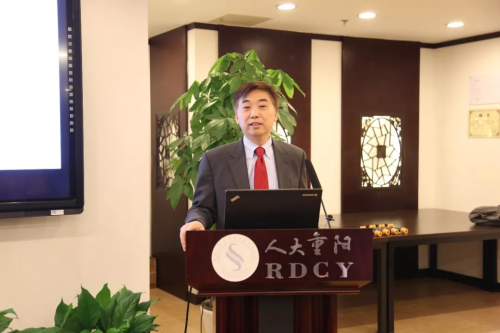Picture
Your Present Location: HOME> PictureWang Hua: China's environmental issues — advanced governance concept & laggard institution building
On December 5, Wang Hua, Dean of the School of Environment and Natural Resources at Renmin University of China, was invited to deliver a lecture entitled 40 years of Chinese environment at Chongyang Institute for Financial Studies at Renmin University of China (RDCY).

Dean Wang Hua said he has been dedicated to environment protection over 34 years. So he shared his own understanding of Chinese environment changes in the past 40 years. He concretely addressed three aspects, including the changes of China’s environmental system, his own pursuits in the past 20 years and the ideas and meanings of institutional building.
Concerning the changes of economy and environment, Dean Wang Hua summarized three sentences: the economy continues to grow rapidly, which impresses the world; environmental problems appear and constantly deteriorate, which is unbearable; part of the environmental problems have been ameliorated and the inflection point started appearing, which gives people expectations.
Since the reform and opening up, China’s environmental problems have developed out of nothing, and later kept deteriorating and became even unbearable. However, part of the environmental problems have been promoted in the past several years. There is no pollution and environmental problems when there is economic development. The pollution increases when we develop the economy. And we start to improve the environment when we become a developed country, at which the inflection point appears. There is a Kuznets curve, which is an inverted U-shaped curve, reaching the apex and then beginning to fall, that is called the inflection point. From international perspective, the inflection point begins to appear when the per capita GDP reaches 8,000 US dollars. China is just at this stage and the inflection point will start to appear. Some typical pollutants have already reached inflection point in China, and the emissions are decreasing regionally.
When it comes to the changes of institution building, Dean Wang Hua also generalized three sentences: from the concept to the method, Chinese environmental institution building has been continuously strengthened and reached the international advanced level; with the rapid development of economy, problems constantly surge and institution building is lagged behind; learning advanced experience internationally makes China have potential advantages. Thus China’s institutional construction is superior to developed countries’ average level.
At present, China’s concept and level in environmental governance have reached the international advanced level. Although China is not as good as western countries in some places, in the overall system and ideas, China is superior. The concept of ecological civilization in China has also promoted international sustainable development. The institution building lags behind because the institutional building always follows the problem. China has developed too fast in the past 40 years, and the problems have also emerged too quickly. The institutional construction cannot predict all the problems, but in fact, China is faster in terms of holistic institution building. As a matter of fact, China has a certain potential advantage because we can learn from the achievements of developed countries. Compared with the same level of development, China's institution building is at an advanced level.
The specific policy means we use in environmental protection, the command and control means are to set standards, there are clear requirements and prohibitions; the economic stimulus means are to use the market tax, fees, transactions to adjust, which costs less than the government control means; persuasive and incentive means include environmental information disclosure policies and public participation systems. In addition, there are information means and social means.
The forty-year changes of environmental protection policy demonstrate the following characteristics: government control means play a leading role, which are highly efficient and highly cost; economic means and social means have significant effects, but they have not been fully utilized; the institutional system needs to be transformed to realize the modernization of the environmental governance system and governance capacity.
Dean Wang Hua noted his innovations in some policies in the past 20 years, including environmental information disclosure, round-table dialogue and environmental social governance.
There are two main points in the disclosure of environmental information. First, from the perspective of building a society ruled by law, only information disclosure can enable ordinary people to realize the right to know, participate, supervise, and claim granted by law. Second, from the perspective of system construction, environmental information disclosure is a feasible and effective policy means for environmental management, and consistent with sewage charges and environmental standards. At present, the main shortcomings of environmental information disclosure are incomplete, inaccurate, untimely, unsustainable, and unfriendly to users. The government should strengthen the leadership, internal coordination, platform construction and database construction.
Round-table dialogue is to let stakeholders, responsible parties, even independent third parties and fourth parties sit together, which is beneficial to improve environment, resolve social contradictions and stimulate a large number of small enterprises. Contradictions related to environment are so complex that some conventional methods, such as negotiation, adjustment, arbitration, and judicial proceedings cannot be settled. The environmental round-table dialogue is a format of many stakeholders, such as government sectors, enterprises, resident representatives, environmental experts, environmental NGOs and media, to have an equal consultation dialogue for environmental issues.

With regard to social governance in environment, the governance system can be divided into three aspects, one is government-related, the second is market-related, and the third is society-related. Environmental social governance refers to using the concepts and methods of social governance to encourage the entire society to protect the environment and settle social conflicts caused by environmental problems. Two aims of environmental social governance are that one is to promote social power to protect environment, the other is to prevent and resolve social conflicts.























































































 京公网安备 11010802037854号
京公网安备 11010802037854号





